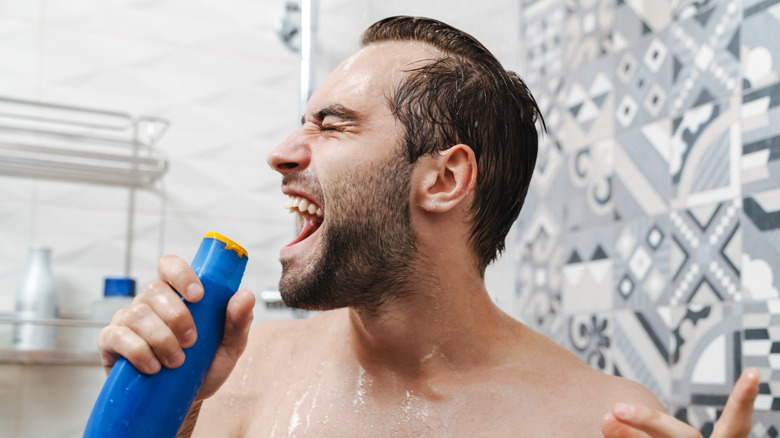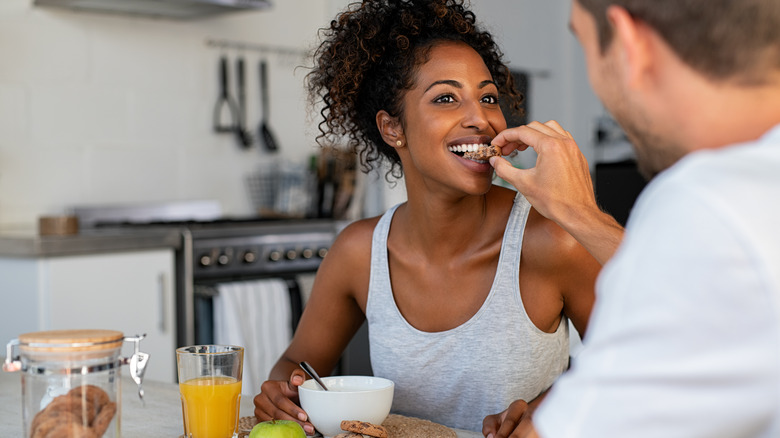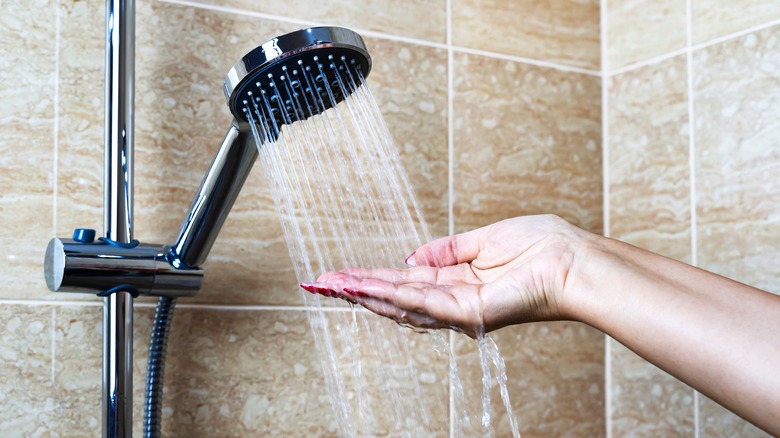Why You Should Think Twice About Showering Right After You Eat
You woke up absolutely famished, so rather than jumping in the shower, you went into full-on brunch mode: eggs, pancakes with a side of sizzling bacon, all washed down with piping hot coffee, and some OJ. Now that you're full and happy, you're ready to get on with your day, and that rainforest faucet awaits you. However, it might not be a great idea to shower right after a meal, according to Healthline. That's because both the process of eating and the shower itself can raise your body temperature, which can interfere with the process of digestion. You could end up feeling sluggish or uncomfortable as a result.
The outlet noted, though, that the science about showering after a meal isn't completely conclusive, and it's also possible that you would not experience these negative effects if the food you ate wasn't, say, an all-you-can-eat-buffet of starches and proteins, but instead was a light salad or some broth. But post-big-breakfast, it can't hurt to take some time to do a crossword puzzle or rinse the dishes before you start rub-a-dub-dubbing.
This is how long you should wait to shower after a meal
You know how when you were a kid, your mom told you to wait for an hour after eating to hop back in that swimming pool? Well, the thinking about post-meal showering is pretty much the same. "After meals, try to wait at least an hour before heading into the shower," gastroenterologist and internist Niket Sonpal, M.D., told Well+Good. "Like swimming, showering can slow down digestion as blood is flowing to other parts of the body."
If you follow the ancient practice of Ayurvedic medicine, make that two hours, not one. As FirstCry Parenting reported, this philosophy teaches that the "fire" from eating gets misdirected towards the skin if you don't allow your body the time it needs to digest. Interfering with these natural bodily cycles could result in discomfort and even illness, according to Ayurveda. While we're making a list of things not to do right after a meal, add exercising, brushing your teeth, and sleeping, Healthline noted. All of these processes need space before and after a meal for optimal results.
Would a cold shower make a difference?
If a steaming hot shower can raise our body temperature and potentially interfere with digestion, does that mean that taking an icy cold shower after eating is the better way to go? On the one hand, cold showers may offer us a number of health benefits, including pain relief, reduced stress levels, and decreased inflammation, just to name a few (via WebMD).
Unlike hot showers, a cold shower will not increase your core body temperature, according to Healthline. Nor will it reroute blood circulation away from your digestive tract. Rather, jumping into a cold shower post-meal may actually boost one's metabolism, allowing the body to burn fat more efficiently. As previously mentioned, however, there is no definitive scientific evidence to confirm the pros or cons of an after-meal shower. But if you find yourself short on time while getting ready for work in the morning and a prompt shower following breakfast is inevitable, you may be better off opting for a cold or room-temperature shower to help keep digestive discomfort at bay.



